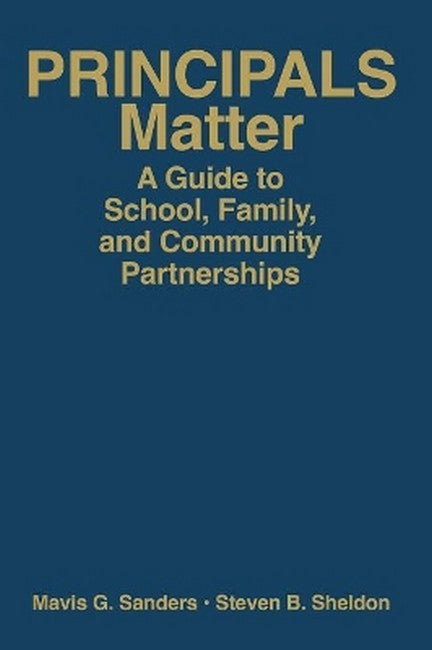Mavis G. Sanders is assistant professor of education in the School of Professional Studies in Business and Education, research scientist at the Center for Research on the Education of Students Placed at Risk (CRESPAR), and senior advisor to the National Network of Partnership Schools at Johns Hopkins University. She is the author of many articles on the effects of school, fam-ily, and community support on African American adolescents' school suc-cess, the impact of partnership programs on the quality of family and community involvement, and international research on partnerships. She is interested in how schools involve families that are traditionally hard to reach, how schools meet challenges for implementing excellent programs and practices, and how schools define "community" and develop mean-ingful school-family-community connections. Her most recent book is Schooling Students Placed at Risk: Research, Policy, and Practice in the Education of Poor and Minority Adolescents (Lawrence Erlbaum, 2000). She earned her PhD in education from Stanford University. Steven B. Sheldon is a research scientist with the Center on School, Family, and Community Partnerships and director of research of NNPS at Johns Hopkins University. He is the author of many publications on the implementation and effects of programs for family and community involvement. His work explores how the quality and outreach of school programs of partnerships affect parents' responses and student outcomes, such as student attendance, math achievement, student behavior, reading, and state achievement test scores. His most recent book guides principals in their leadership and work on school, family, and community partnerships (with Mavis Sanders, Corwin Press, 2009). In his current research, Sheldon is studying the influences of parents' social networks, beliefs, and school outreach on patterns of parental involvement at school and at home and results for students. He earned his PhD in educational psychology from Michigan State University.
Request Academic Copy
Please copy the ISBN for submitting review copy form
Description
Acknowledgments About the Authors Introduction: Standards for School, Family, and Community Partnerships Part I. Laying the Foundation 1. Policy, Theory, and Research on School, Family, and Community Partnerships Partnerships and Academic Outcomes Partnerships and Nonacademic Outcomes Why This Matters for Principals Reflection Questions 2. Reculturing Schools for School, Family, and Community Partnerships Schools as Community Institutions Developing a Coordinated Program of School, Family, Community Partnerships Principal Leadership and School Outcomes Obstacles to Effective School, Family, and Community Partnerships Steps Toward Recultured Schools Why This Matters for Principals Reflection Questions Part II. Responding to Diversity 3. Fathers and School, Family, and Community Partnerships Why Fathers Matter Father Demographics The Role of Fathers Guidelines for Developing Partnership Efforts to Involve Fathers Why This Matters for Principals Reflection Questions 4. Families of Children With Disabilities and School, Family, and Community Partnerships IDEA and Children With Special Needs District and School Outreach to Families of Children With Disabilities Specific Needs and Experiences of Families of Children With Disabilities Engagement Strategies for the Families of Children With Disabilities Creating Inclusive Environments for Special Needs Populations Why This Matters for Principals Reflection Questions 5. Linguistically Diverse Families and School, Family, and Community Partnerships Growth in Immigration and Limited English Proficient Students and Families LEP Students and Families LEP Students and NCLB Strategies to Facilitate the Involvement of LEP Families Culturally Intelligent Principal Leadership Why This Matters for Principals Reflection Questions 6. Families Living in Poverty and School, Family, and Community Partnerships Challenges Faced by Low-Income Families Avoiding a Deficit Perspective A Collaborative Approach Why This Matters for Principals Reflection Questions Part III. Maximizing Outcomes 7. Evaluating Programs of School, Family, and Community Partnerships Planning an Evaluation Collecting Data Presenting the Findings Why This Matters for Principals Reflection Questions Concluding Thoughts References Index
"The book provides a vast overview of the many key aspects of partnerships between schools, families, and communities grounded in data and research that illustrates the positive impact that strong stakeholder partnerships have on student achievement. The examples, vignettes, and stories provide rich material to illuminate the points addressed." -- Belinda Gimbert, Assistant Professor "An excellent book. Each chapter opens with relevant research and presents suggestions for practical applications. As a principal, I would buy this book for a task force or professional learning community." -- Julie C. Burger, Principal "There is so much valuable information in this book that any administrator, regardless of experience, can gain huge benefits from reading it and putting into effect many of the suggested activities and programs." -- Marian Hermie, Clinical Associate Professor "What sets this book apart from other school and community source books is that it addresses specific populations that are often alienated by schools: fathers, parents of children with disabilities, and families of poverty. It provides a good overview of key research on the topic of family involvement in schools, its impact, and practices for obtaining involvement." -- William Ruff, Assistant Professor

